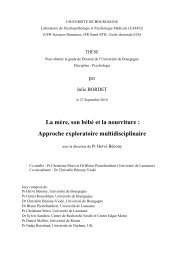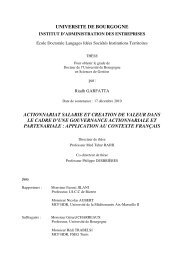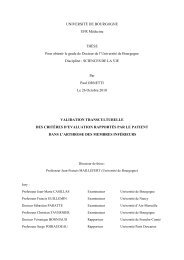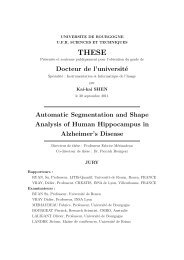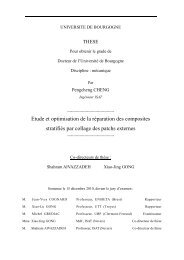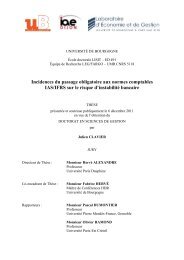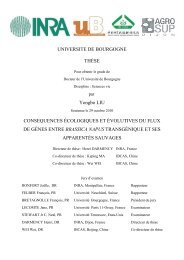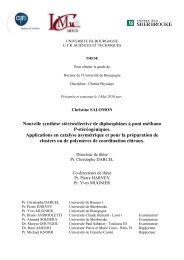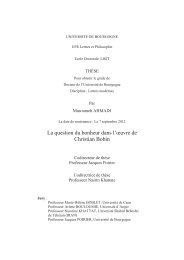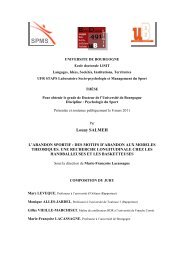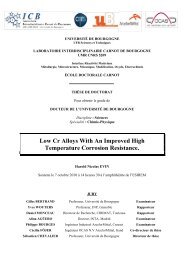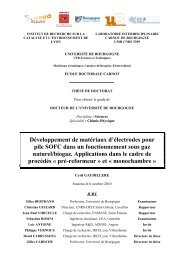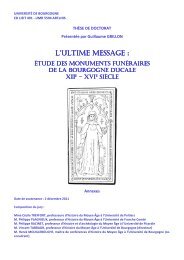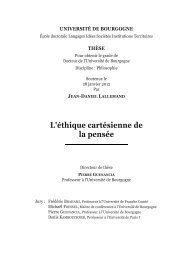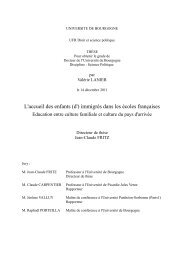Higher education in Asian countries and the role of international ...
Higher education in Asian countries and the role of international ...
Higher education in Asian countries and the role of international ...
You also want an ePaper? Increase the reach of your titles
YUMPU automatically turns print PDFs into web optimized ePapers that Google loves.
264<br />
system, decentralization <strong>and</strong> devolution <strong>of</strong> power at local level <strong>and</strong> more autonomy to higher<br />
<strong>education</strong> <strong>in</strong>stitutions. Whereas <strong>the</strong> second po<strong>in</strong>ter was associated with <strong>the</strong> <strong>in</strong>crease <strong>in</strong> <strong>the</strong><br />
enrolment at post secondary level, <strong>in</strong>crease <strong>in</strong> <strong>the</strong> school life expectancy form primary to tertiary<br />
level, <strong>and</strong> quality development <strong>and</strong> enhancement <strong>in</strong>itiatives.<br />
The three organizations, UNESCO, OECD <strong>and</strong> <strong>the</strong> World Bank, follow three different models; it<br />
is evident from <strong>the</strong>ir structure, function <strong>and</strong> <strong>in</strong>itiatives. Though <strong>the</strong>se IGOs have different<br />
objectives but <strong>the</strong>ir agenda are overlapp<strong>in</strong>g <strong>in</strong> nature: <strong>the</strong> change <strong>and</strong> development through<br />
cooperation. The uniformity <strong>in</strong> <strong>the</strong> IGOs‟ goals <strong>and</strong> convergence <strong>in</strong> <strong>the</strong>ir attitude is evident from<br />
<strong>the</strong>ir objectives, action <strong>and</strong> <strong>in</strong>itiatives. OECD <strong>and</strong> <strong>the</strong> World Bank are economic organizations<br />
but very different from each o<strong>the</strong>r: OECD is an <strong>in</strong>tellectual hub <strong>and</strong> th<strong>in</strong>k tank that contribute to<br />
economic development <strong>in</strong> high <strong>in</strong>come <strong>countries</strong> through policy guidel<strong>in</strong>es <strong>and</strong> analyses; <strong>the</strong><br />
World Bank is lend<strong>in</strong>g agency contribute to <strong>the</strong> socio-economic development <strong>in</strong> poor <strong>countries</strong><br />
through f<strong>in</strong>ancial <strong>and</strong> technical assistance. In contrast, <strong>the</strong> UNESCO is has its presence both <strong>in</strong><br />
high <strong>and</strong> low <strong>in</strong>come <strong>countries</strong> <strong>and</strong> it has comparatively a bigger network; broader agenda <strong>and</strong><br />
diverse <strong>role</strong>s: a laboratory <strong>of</strong> ideas, st<strong>and</strong>ard-setter, capacity-builder, <strong>and</strong> catalyst organization.<br />
All <strong>the</strong> three IGOs are engaged <strong>in</strong> <strong>the</strong> field <strong>of</strong> <strong>education</strong> <strong>in</strong>clud<strong>in</strong>g higher <strong>education</strong> but none <strong>of</strong><br />
<strong>the</strong>m considers higher <strong>education</strong> as priority area. In Asia, UNESCO is reach<strong>in</strong>g <strong>and</strong> work<strong>in</strong>g<br />
through more than 42 national commissions <strong>and</strong> n<strong>in</strong>eteen field <strong>of</strong>fices <strong>in</strong>clud<strong>in</strong>g Bangkok<br />
regional <strong>of</strong>fice for <strong>education</strong>; <strong>the</strong> Bank has more than thirty country-<strong>of</strong>fices <strong>in</strong> member states<br />
while OECD has only one <strong>of</strong>fice that is located <strong>in</strong> Japan. Comparatively both UNESCO <strong>and</strong> <strong>the</strong><br />
World Bank have larger presence <strong>in</strong> Asia <strong>in</strong> terms <strong>of</strong> programs, projects memberships, <strong>and</strong><br />
<strong>of</strong>fices at regional <strong>and</strong> national levels. But UNESCO is more active <strong>and</strong> visible <strong>in</strong> <strong>the</strong> region at<br />
<strong>in</strong>stitutional levels through UNESCO Chair <strong>and</strong> UNITWIN, ASPnet <strong>and</strong> o<strong>the</strong>r Programs.<br />
UNESCO has produced many conventions <strong>and</strong> declarations, which act as not only <strong>in</strong>ternational<br />
legal documents but also helpful <strong>in</strong> <strong>the</strong> creation <strong>of</strong> new laws <strong>and</strong> br<strong>in</strong><strong>in</strong>g policy reforms <strong>in</strong><br />
<strong>education</strong> sector <strong>in</strong> <strong>the</strong> member <strong>countries</strong> whereas <strong>the</strong> Bank also encourage policy reform but<br />
achieve this through technical assistance <strong>and</strong> sometime l<strong>in</strong>ks it with loan.<br />
The outcomes <strong>of</strong> IGOs <strong>in</strong>itiatives, <strong>in</strong> <strong>Asian</strong> region, are not directly measurable as <strong>the</strong> long-term<br />
impact <strong>of</strong> <strong>the</strong>ir assistance <strong>and</strong> <strong>in</strong>itiatives is extensive as well as cumulative. But IGOs‟ <strong>role</strong> can<br />
be observed from <strong>the</strong> pace <strong>and</strong> direction <strong>of</strong> change <strong>in</strong> <strong>the</strong> member <strong>countries</strong>. The IGOs‟ policy<br />
reform <strong>in</strong>itiatives have contributed to <strong>the</strong> change <strong>in</strong> <strong>the</strong> member <strong>countries</strong> as <strong>in</strong> <strong>the</strong> majority <strong>of</strong>



